After seeing how many rabbit owners are curious to know if their rabbit can eat dog food, we have decided to make thorough research on this query (can rabbits eat dog food) and in this article, we will be sharing all you need to know with you.
While feeding your rabbit dog food is not poisonous or toxic, it should still be avoided at all costs.
As a rabbit owner, it’s crucial to understand that bunnies fall under the herbivorous category. This means that they should be placed on a strictly plant-based diet.
Dog foods do not meet the nutritional needs of rabbits and it poses a lot of risks to their health.
Keep reading because, in this article, you will get to know the reasons why rabbits should not eat dogs, the potential risks of rabbits eating dog food, and also the importance of a balanced rabbit diet.
Without further ado, let’s begin!
Understanding a Rabbit’s Dietary Needs
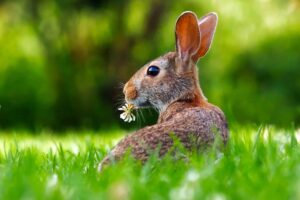
Rabbits are herbivores, and their digestive systems are designed to process a diet high in fiber.
By analyzing their alimentary tract, you can tell dog foods will be harmful to them. Their dentition is different from dog’s own, their alimentary tract is more complex compared to dog’s own and they lack the necessary enzymes needed to digest dog food.
Rabbit teeth are specialized for grinding while dog teeth are for tearing and chewing. Giving your rabbit dog food may damage his teeth and even cause some bacteria to build up on his teeth.
Rabbit also lacks the enzyme needed to properly digest dog feed. The enzyme that aids digestion in rabbits is called cellulase.
Unlike dogs and other carnivores, rabbits are herbivorous animals that primarily consume plant material, such as grasses and hay, which are rich in cellulose, a complex carbohydrate found in the cell walls of plants.
Rabits have a specialized enzyme they produce that helps them break down cellulose.
Cellulase helps break down cellulose into simpler sugars, such as glucose, which can be further digested and absorbed by the rabbit’s body.
Apart from Hays and Grasses, rabbits need a variety of fresh vegetables and fruits to provide essential vitamins and minerals.
A balanced rabbit diet consists of these elements in the appropriate proportions to support their overall well-being.
Assessing the Nutritional Content of Dog Food
Dog food, on the other hand, is specifically formulated to meet the nutritional requirements of dogs.
It typically contains a different composition of nutrients, such as higher protein levels, which may not align with a rabbit’s dietary needs.
Dogs are omnivorous and the nutritional content of their food is optimized for their specific nutritional needs, including their unique metabolism and digestive system.
The protein, fats, and grain-based carbohydrate contained in dogs’ food is harmful to rabbits.
According to Doctor. Susan Brown of Veterinary Partner. She said dog food is capable of disturbing the normal intestinal flora of rabbits. This can lead to intestinal distress and can even be fatal.
Suitable Food Options for Rabbits

To provide rabbits with a healthy diet, it’s essential to offer them suitable food options that align with their nutritional needs.
A balanced rabbit diet should contain fresh hay and grasses, fresh vegetables in a reasonable quantity, quality rabbit pellets, and plenty amount of clean and treated water.
1. Hay and Grass
Hay and grass should form the foundation of a rabbit’s diet. Timothy hay is particularly beneficial for rabbits, as it aids in proper digestion and keeps their teeth in good condition.
Fresh grass, free from pesticides or chemicals, can also be offered, provided it is not from areas where other animals may have contaminated it.
2. Fresh Vegetables and Fruits
Fresh vegetables and fruits play a crucial role in providing rabbits with essential vitamins and minerals.
Some safe options include leafy greens like kale, spinach, and romaine lettuce, as well as carrots, bell peppers, and apples. However, it’s important to introduce new foods gradually and monitor a rabbit’s response to prevent any digestive issues.
After feeding your rabbit with a new vegetable, if you notice any sudden change in their behavior or health issue such as diarrhea or vomiting. Stop the vegetable immediately and consult with your vet.
Here are 10 of the most common vegetables recommended for rabbits:
- Romaine lettuce
- Kale
- Spinach
- Parsley
- Carrot tops (greens)
- Cilantro
- Basil
- Mint
- Dill
- Bok choy
3. Pellets Formulated for Rabbits
Pellets specifically formulated for rabbits can serve as a convenient way to provide additional nutrients.
Look for high-quality pellets with a high fiber content and avoid those with added sugars or unnecessary fillers.
Pellets should be offered in moderation, complementing a diet rich in hay, grass, and fresh vegetables.
What Are the Potential Risks of Feeding My Rabbit with Dog Food
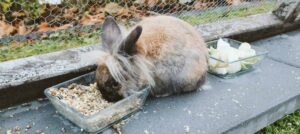
Bunnies have a distinct digestive system compared to dog and their nutritional needs differs a lot. There are a lot of risks attached to feeding your rabbit with dog food. Some may even be fatal if care is not taken.
Here are some of the risks of feeding your rabbit with dog food:
Urinary Tract Infection
Rabbit needs a certain quantity of calcium in their diet. However, when it is in excess it can lead to problems in the urinary tract.
Dog food usually contains a high level of calcium. When rabbits feed on foods like this, they will be unable to digest and assimilate the calcium properly and this will result in blockage of the urinary tract or even kidney stones.
Kidney Damage
Dog food contains a lot of protein derived from animals. However, it’s crucial to understand that rabbits are not designed to digest proteins like dogs.
Their digestive system is built for processing plant-based foods. When rabbits eat food with too much protein, it can harm their kidneys because they are unable to handle it effectively.
Obesity
Unlike dogs, rabbits are not as active and do not engage in regular exercise.
When rabbits eat dog food, which is often high in fats and carbohydrates, their bodies have a slower metabolism. As a result, the fats from the food get stored in their bodies instead of being burned off.
This can lead to obesity in rabbits, which in turn can cause health problems like hip dysplasia and arthritis.
Dental Damage
Rabbit dentition is designed for steady grinding of foods unlike that of a dog which is designed for tearing flesh.
Foods like hay, grasses, green and other leafy food help rabbits to maintain healthy teeth, and rabbits may develop dental disease by chewing on dog food.
Intestinal Disorder
According to Dr. Brown of Veterinary Partner, even a minute amount of dog food is enough to disturb the intestinal flora of rabbits.
When a rabbit eats dog food, digesting it will become a problem due to the absence of necessary digestive enzymes in his digestive tract.
Intestinal disorders may be fatal if proper care is not taken.
Here are some of the symptoms that show your dog is suffering from intestinal distress:
- Restlessness
- Vomiting
- Diarrhea
- Drinking excessive water
- Lethargy
Consult with your vet immediately when you notice any of these symptoms.
Potential Toxicity
Certain ingredients commonly found in dog food can be toxic to rabbits. Feeding your rabbit, a dog food that contains harmful substances can have severe consequences for his health.
What Foods Are Toxic to Rabbits
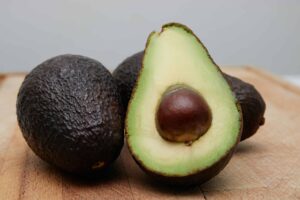
Unlike dogs, which typically require 2-3 meals a day, rabbits have a continuous need for hay or grass.
Observing rabbits nibbling on various objects is not unusual. However, if you ever catch your rabbit attempting to consume any of the foods listed in this section, it is vital to intervene and prevent them from doing so promptly.
Here are the foods that are toxic to rabbits:
- Avocado
- Bread, pasta, and crackers (High carbohydrate foods)
- Cauliflower
- Chocolate
- Dog and Cat Food
- Iceberg Lettuce (All light-colored lettuce)
- Nuts
- Oatmeal
- Onions, garlic, shallots, and chives (Allium vegetables)
- Peanut Butter
- Potatoes
- Raisins (Most Dried Fruit)
- Sugary and/or processed foods
- Yogurt
Conclusion
Dogs and rabbits have different dietary needs, and it is clear that feeding dog food to rabbits is not recommended.
Rabbits require a diet rich in fiber, primarily consisting of hay, grass, fresh vegetables, and fruits. While dogs on the other hand require a diet rich in protein, fats, and carbohydrates.
Offering dog food to rabbits can result in numerous health issues such as obesity, Urinary Tract Infection (UTI), kidney damage, dental damage, etc.
To ensure the well-being of your rabbit, it is essential to provide a balanced diet tailored to their specific needs and consult with a veterinarian for expert guidance.
Frequently Asked Questions (FAQs)
Can rabbits eat cat food instead of dog food?
NO, cats are obligate carnivores and their nutritional requirements are very different from that of rabbits. Stick to a diet suitable for rabbits to ensure their health and well-being.
What are the signs of a rabbit with an unbalanced diet?
Signs of an unbalanced diet in rabbits can include weight loss, abnormal stool consistency, a dull coat, and a general decline in overall health. If you notice these signs, consult with a veterinarian to adjust your diet accordingly.
Is it safe to give rabbits treats?
While treats can be given in moderation, it’s important to choose rabbit-safe treats specifically made for them. Avoid sugary or high-fat treats, as they can lead to obesity and other health issues.
Can rabbits survive on hay alone?
Hay is a crucial component of a rabbit’s diet and provides the necessary fiber. However, rabbits also require a variety of fresh vegetables, fruits, and pellets formulated for rabbits to obtain balanced nutrition.


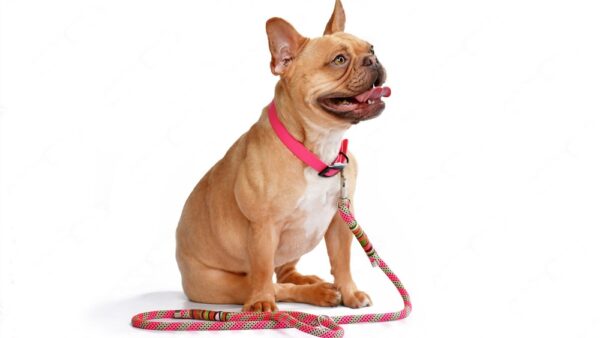
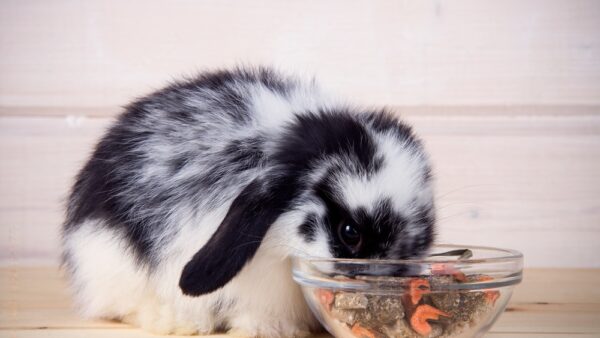

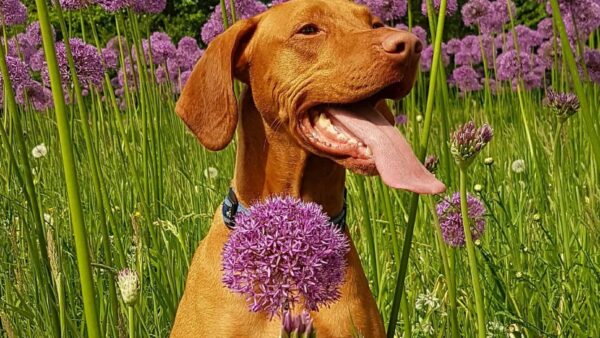

Leave a comment